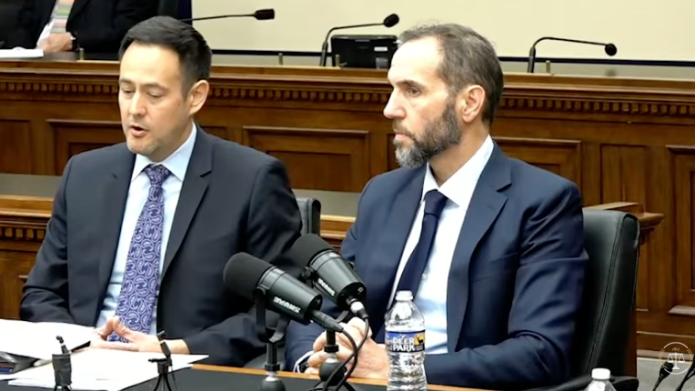Wake up with the Washington Examiner: Biden’s ‘Trump-proofing’ plan and GOP’s war with Walz’s service record – Washington Examiner
The article discusses two main topics concerning current political dynamics: President Joe Biden’s efforts to “Trump-proof” his administration’s initiatives and the ongoing political conflict involving Minnesota Governor Tim Walz’s military service record.
1. **Biden’s “Trump-proofing” Strategy**: The article highlights how President Biden is taking measures to secure his legacy amidst concerns of a potential second term for Donald Trump. Biden reversed Trump’s controversial ”Schedule F” order, which allowed the president to more easily fire federal employees, and implemented new regulations designed to protect federal workers from swift removals. This push aims to solidify Biden’s accomplishments and create barriers that would prevent a rapid dismantling of his policies should a Republican administration take over. The article notes the complexities of the Congressional Review Act and its implications for Biden’s regulatory changes.
2. **GOP Attacks on Walz’s Military Record**: The second part covers the political tension between Republican Senator J.D. Vance and Democratic Governor Tim Walz regarding their respective military backgrounds. Vance criticizes Walz for retiring from the Army National Guard shortly before his unit was deployed to Iraq, accusing him of abandoning his service. The timing of Walz’s retirement has come under scrutiny, and Vance uses it as a point to question Walz’s commitment compared to his own service in combat. Walz’s past comments about his military experience have also drawn criticism from Vance and Republicans, adding fuel to the political battle as both seek their parties’ vice presidential nominations.
the article addresses the proactive steps Biden is taking to protect his legacy against potential reversals by Trump and the contentious debate surrounding military service records in the evolving political landscape.
Wake up with the Washington Examiner: Biden’s ‘Trump-proofing’ plan and GOP’s war with Walz’s service record
Regulation check
Presidents don’t like to see their legacies go up in smoke days after they leave office. And a recent trend in relying heavily on their “pen and phone” prerogatives has made that a more common occurrence.
President Joe Biden is worried about more than his achievements, though. He and his administration have eyes on how a second Donald Trump term could affect not only the things Biden has done in office but also how the government as a whole operates.
In the second part of our series examining how Biden and Democrats are seeking to “Trump-proof” the government, White House Reporter Haisten Willis explored three primary ways the Biden administration has put up barriers around the president’s legacy — and how Republicans can chip away at each of them.
One of the largest concerns for Democrats is Trump’s “Schedule F” push he tried to institute last time he was in office. The executive order reclassified thousands of executive branch employees and made it easier to fire them — at the president’s pleasure. Biden reversed that order as soon as he stepped into the Oval Office, and Trump took notice, vowing to strike at the heart of the “deep state” as soon as he was back in power.
“We will pass critical reforms making every executive branch employee fireable by the president of the United States,” Trump said in 2022. “The deep state must and will be brought to heel.”
Haisten helpfully put Trump’s “deep state” and “every executive branch employee” comments into perspective for us:
“When he says ‘deep state,’ Trump is referring to roughly 2.2 million federal employees who are beyond the reach of the president and thus, according to conservatives, unaccountable to taxpayers. Though Trump said ‘every’ executive branch employee would be fireable if he won, his actual proposal would only affect a small percentage of them,” he wrote.
The basis for Biden’s authority to remove Schedule F provided the heft behind the regulatory push his administration has made to cement initiatives and plans that couldn’t be overturned on Day One of a Trump presidency.
“Biden moved in early April to finalize rules that would put federal government employees behind a regulatory wall that could not easily be torn down,” Haisten wrote.
“The Biden administration’s new rule was finalized in April, early enough to escape the Congressional Review Act, which gives Congress a 60-day window to pass resolutions that ‘disapprove’ of an executive branch agency regulation through an expedited process,” he wrote.
The Congressional Review Act, under the right circumstances, can empower Congress to gut executive branch attempts to write rules — though there is a catch.
Economics and Business Reporter Zachary Halaschak had a helpful explainer earlier this summer:
The CRA is a powerful deregulatory tool when used in the right context. It allows Congress to easily vote to cancel recent rules through a joint resolution of disapproval. In order to rescind the rule, the resolution needs a simple majority vote in both the House and the Senate and then needs to be signed by the president. The rule is then canceled and cannot be enforced.
Critically, CRA resolutions can be brought up for a vote on an expedited basis in the Senate by any member. Generally, legislation requires 60 votes in the Senate to advance, because of the filibuster, which allows a minority of 40 or more to hold up bills. CRA resolutions, though, bypass the filibuster.
If the president vetoes the resolution, Congress can still roll back the rule if two-thirds of lawmakers vote to override the veto.
One limitation of the CRA, though, is that a lawmaker has to file the resolution within 60 working days of the rule being reported. That means that Congress can cancel only relatively recent rules.
So, there are time limits and majority questions that need to be considered if Republicans want to cancel a president’s power play. And in the case of one Biden attempt at rewriting the rulebook, there is a legal aspect that can interfere as well.
In his attempt to rewrite Title IX rules to change the definition of sex to include transgender identities, Biden has run into both Congress voting to undo his rule and courts blocking it from going into effect. Most of the rule was finalized in April, well before the 60-day timeline, but if the legal problem of enacting it everywhere isn’t sorted before he leaves office, it will be much easier for Trump and a possible GOP-run House and Senate to nix the rule.
Click here to read more about the up and down efforts to “Trump-proof” Biden’s legacy.
GOP goes to war with Walz’s military record
Sen. J.D. Vance (R-OH) is known in part for his record as a Marine. Gov. Tim Walz (D-MN) served 24 years in the Army National Guard and has referenced his service in select spots.
The two men are now pitted against each other as the vice presidential candidates for their respective parties, and a war is brewing over how they talk about and how they are talked about when it comes to their service records.
Defense Reporter Mike Brest took a look at Walz’s long record with the Army National Guard that spanned from April 8, 1981, to May 16, 2005. That end date, in particular, has been the point of attack for Vance and Republicans who charge Walz, who never went into a combat zone, decided to retire from the service when his unit got orders to go to Iraq.
“When the United States Marine Corps, when the United States of America asked me to go to Iraq to serve my country, I did it,” Vance said this week. “I did what they asked me to do, and I did it honorably, and I’m very proud of that service. When Tim Walz was asked by his country to go to Iraq, you know what he did? He dropped out of the Army and allowed his unit to go without him.”
The timeline Vance lays out isn’t so clear.
“About two months after Walz retired, his unit received its orders to deploy to Iraq, according to a National Guard article. The unit mobilized in September of that year to train and finally deployed in July 2006. The unit’s 22-month deployment was the longest continuous deployment of any military unit during Operation Iraqi Freedom at the time it returned,” Mike wrote.
“Walz filed paperwork with the Federal Election Commission to run as a candidate for Minnesota’s 1st Congressional District on Feb. 10, 2005, prior to his separation. He won the election and was sworn into office on Jan. 3, 2007,” he wrote.
However, while the timeline of events shows Walz had made plans to retire before receiving orders to go overseas, comments he has made since, ones that have been amplified by the Harris campaign, could come back to haunt him.
At an event in 2018, responding to the Parkland, Florida, school shooting, Walz said it was possible to “make sure that those weapons of war, that I carried in war, is the only place where those weapons are at.”
Vance and Republicans have blasted Walz for being loose with his words, taking credit for participating in a combat zone when he never has. Vance, Mike pointed out, “spent four years in the Marines as an enlisted combat correspondent in public affairs. He deployed to Iraq for about six months and left the service in 2007 as a corporal.”
Click here to read more about the service records taking center stage in the vice president fight.
New from us
Harris’s illegal immigration fraud factory
Republicans for Harris lean on memory of John McCain in battleground Arizona
Tim Walz worried about corporate power. He still took their checks
After 2016 letdown, Harris revives Democratic hopes for first ‘Madam President’
In case you missed it
Election forecasters are making moves as Harris momentum keeps rolling
Biden is worried 2025 will have a Jan. 6 redux
J.D. Vance wanted to look at his “future plane” in Wisconsin
For your radar
Biden will call Gov. Josh Green (D-HI) and Maui County Mayor Richard Bissen to commemorate the first anniversary of the Maui wildfires. He will later host the 2023 World Series champion Texas Rangers at the White House at 4 p.m. before leaving for Wilmington, Delaware, where he and first lady Jill Biden will meet with campaign staffers at 6:30 p.m. Biden will spend the weekend in Rehoboth Beach.
Harris continues her barnstorming with rallies in Detroit, Michigan, at 3:10 p.m. before traveling to Phoenix, Arizona.
" Conservative News Daily does not always share or support the views and opinions expressed here; they are just those of the writer."




